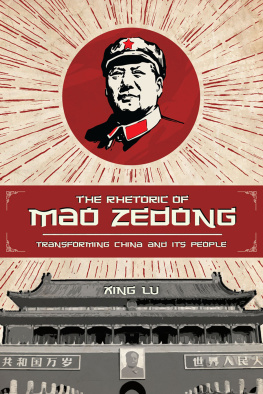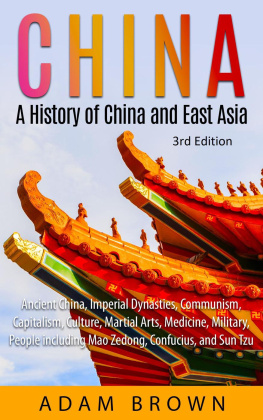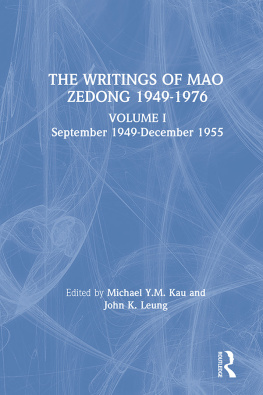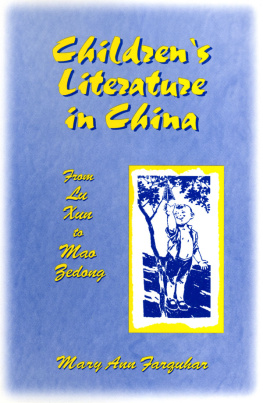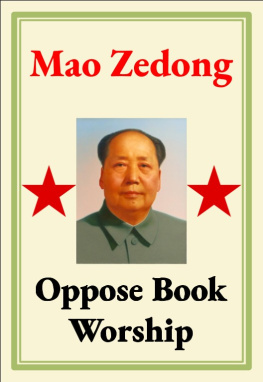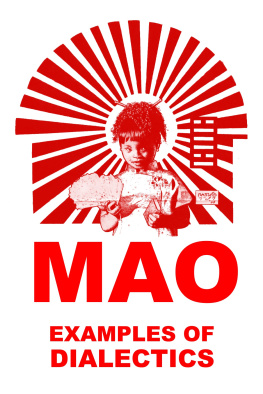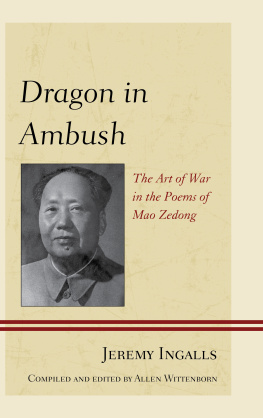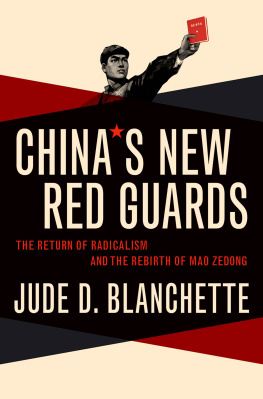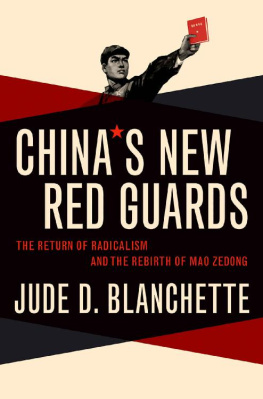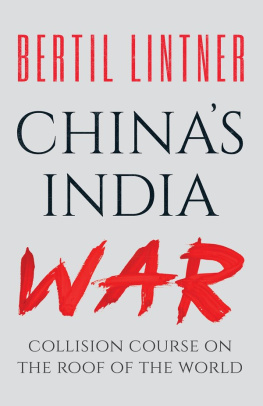Lu - The Rhetoric of Mao Zedong: Transforming China and Its People
Here you can read online Lu - The Rhetoric of Mao Zedong: Transforming China and Its People full text of the book (entire story) in english for free. Download pdf and epub, get meaning, cover and reviews about this ebook. year: 2017, publisher: University of South Carolina Press, genre: Science. Description of the work, (preface) as well as reviews are available. Best literature library LitArk.com created for fans of good reading and offers a wide selection of genres:
Romance novel
Science fiction
Adventure
Detective
Science
History
Home and family
Prose
Art
Politics
Computer
Non-fiction
Religion
Business
Children
Humor
Choose a favorite category and find really read worthwhile books. Enjoy immersion in the world of imagination, feel the emotions of the characters or learn something new for yourself, make an fascinating discovery.
The Rhetoric of Mao Zedong: Transforming China and Its People: summary, description and annotation
We offer to read an annotation, description, summary or preface (depends on what the author of the book "The Rhetoric of Mao Zedong: Transforming China and Its People" wrote himself). If you haven't found the necessary information about the book — write in the comments, we will try to find it.
Lu: author's other books
Who wrote The Rhetoric of Mao Zedong: Transforming China and Its People? Find out the surname, the name of the author of the book and a list of all author's works by series.
The Rhetoric of Mao Zedong: Transforming China and Its People — read online for free the complete book (whole text) full work
Below is the text of the book, divided by pages. System saving the place of the last page read, allows you to conveniently read the book "The Rhetoric of Mao Zedong: Transforming China and Its People" online for free, without having to search again every time where you left off. Put a bookmark, and you can go to the page where you finished reading at any time.
Font size:
Interval:
Bookmark:

The Rhetoric of Mao Zedong
Studies in Rhetoric/Communication
Thomas W. Benson, Series Editor
The Rhetoric of Mao Zedong
Transforming China and Its People
Xing Lu

The University of South Carolina Press
2017 University of South Carolina
Published by the University of South Carolina Press
Columbia, South Carolina 29208
www.sc.edu/uscpress
26 25 24 23 22 21 20 19 18 17
10 9 8 7 6 5 4 3 2 1
Library of Congress Cataloging-in-Publication
Data can be found at http://catalog.loc.gov/
ISBN 978-1-61117-752-7 (cloth)
ISBN 978-1-61117-753-4 (ebook)
This book is dedicated to my father, Lu Rong ,
and my mother, Jiang Hong ;
both are the sources of my inspiration and wisdom.
Contents
Series Editors Preface
In The Rhetoric of Mao Zedong, Professor Xing Lu offers a wide-ranging history and criticism of one of the most important revolutionary and national leaders of the twentieth century. Mao Zedong (18931976) rose to leadership of the Chinese Communist Party, commanded party and army in revolution, war, and civil war, and assumed his role as unchallenged leader of China from 1949 until his death in 1976. A large part of his power, and a core element in Maos transformation of China, stemmed from his education in Confucian and Marxist thought and his adaptation of that thought in a rhetoric of class struggle, Marxism-Leninism with Chinese characteristics, and doctrines of serving the people, criticism and self-criticism, and Chinese nationalism. These themes, articulated in Maos rhetoric, guided national policy and infused daily life and human relationships.
Professor Xing Lu is the author of Rhetoric in Ancient China, Fifth to Third Century B.C.E., and Rhetoric of the Chinese Cultural Revolution, both published by the University of South Carolina Press. In The Rhetoric of Mao Zedong, Xing Lu traces the beginnings of Maos rhetoric, his rhetorical theories, his rhetorical style, and his rhetorics of class struggle, construction of the new communist person, Chinese nationalism, and Chinese foreign policy, concluding with an extended discussion of the legacy of Maos rhetoric in China after Mao Zedong. Professor Xing Lu, who was born in Maos China in 1956 and who was also educated in China, later earned a doctorate in rhetoric and communication at the University of Oregon; she is currently a professor of communication at DePaul University in Chicago. She brings to her study of the rhetoric of Mao Zedong a deep personal history and an impressive mastery of two great cultural traditions.
THOMAS W. BENSON
Preface
I was born in 1956, when China was at the end of its first Five-Year Plan, a centralized economic endeavor based on the Soviet model for socialist development. Mao Zedong and his army had liberated As the numbers indicate, Chinese living standards improved immensely as compared to those of previous decades, and citizens began to enjoy equal access to education, equal pay for men and women, and free medical coverage. Corruption was rare, and prostitution and drug-related crimes were entirely eradicated. People helped each other, had a great sense of national pride and social security, and exhibited high enthusiasm for constructing a new, socialist China. Chinese society was, at least comparatively speaking, both stable and thriving.
My mother always told me that 1956 was a good year. That year was Maos launching pad for the rest of contemporary Chinese history. If he had not instigated the Anti-Rightist Movement the following year, if he had not inaugurated the Great Leap Forward in the year of 1958, and if he had not launched the Cultural Revolution ten years after 1956, China would have embarked on a trajectory toward economic growth and industrialization at least three decades sooner. Mao Zedong would have left the global scene as an unmitigated national and international hero. However, Maos cult of personality, the Soviet model of one-party rule, and the dogma of class struggle combined with his despotic leadership ensured Maos status as a powerful and yet deeply controversial twentieth-century world leader.
As I was growing up, I learned from my textbooks and teachers that Mao was the savior of China, that there would have been no new China without Mao, and that the Chinese people would still be suffering under a semicolonial rule of foreign powers and the feudal systems without Mao. Consequently I had great reverence for Mao. This veneration intensified in 1966, the first year Mao launched the Cultural Revolution. I was in the third grade. We ceased our usual studies and We recited them every morning. Our teacher told us how to interpret Maos words and instructed us how to apply them to our everyday lives.
The more quotations we could recite, the more revolutionary we proved ourselves to be. Passion among the Chinese people for Mao and his ideas was widespread and intense. I remember in particular one popular song that we sang all the time to demonstrate how much we loved Maos works. One section of the lyrics follows:
I love reading Chairman Maos books the most.
I have studied them thousands of times.
I carefully decipher profound messages (in these books).
I feel warmth in my heart (when reading them).
I feel as if a timely rain was quenching drought-stricken land.
Crops are drenched with dew.
Chairman Maos quotations have nourished me;
I now have more energy to participate in the Revolution.
Word by word, line by line,
I read and think at the same time.
Revolutionary truth shines through his words;
Every word speaks directly to my heart;
Just like a key that can open a thousand locks.
During the Cultural Revolution, I carried Chairman Maos Little Red Book in my pocket every day and everywhere I went, just like everyone else. I cut my hair short and wore a mans jacket with a Mao badge on it and soldiers shoes, as Mao expected young women to be masculine and militant. In my familys small apartment (fifteen square meters for six of us), we hung twenty Mao portraits on the walls. This was not atypical of other Chinese families. My mother bought and traded over a hundred Mao badges of various designs. In my childhood diary, I quoted Maos sayings ad infinitum, and I criticized myself for any thoughts or actions that deviated from Maos teachings. In addition I would think of Maos words when faced with challenging situations. I attended public rituals dedicated to the worship of Mao, and there we would dance and sing songs to worship him. I was ready to defend and fight for Mao; I would do whatever he asked the Chinese people to do, even if it meant sacrificing my life. I grew up in Maos political and rhetorical culture, having inherited his romantic idealism, his speech, and his ways of thinking. As Qian Liqun (), an expert on Mao studies in China, has said, Mao is my spiritual father (2012, 17). Years later I now look back at my own fanaticism and marvel at my complete and utter indoctrination. It was not just me; it was widespread.
But in 1968, two years after the start of Chinas Cultural Revolution, Chairman Mao Zedong faced a formidable challenge. In the wake of crippling economic devastation and widespread closure of universities, it had become clear that higher education (or indeed even urban employment) was no longer a viable option for the majority of Chinas youths. Fearing that the younger urban generation might foment social chaos if they remained idle, Mao Zedong issued a call to action: On December 22, 1968, he published a directive in the
Next pageFont size:
Interval:
Bookmark:
Similar books «The Rhetoric of Mao Zedong: Transforming China and Its People»
Look at similar books to The Rhetoric of Mao Zedong: Transforming China and Its People. We have selected literature similar in name and meaning in the hope of providing readers with more options to find new, interesting, not yet read works.
Discussion, reviews of the book The Rhetoric of Mao Zedong: Transforming China and Its People and just readers' own opinions. Leave your comments, write what you think about the work, its meaning or the main characters. Specify what exactly you liked and what you didn't like, and why you think so.

